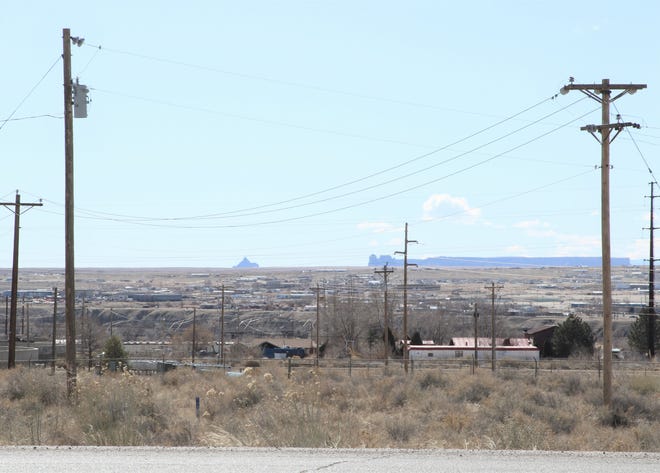Legislative roundup: New Mexico House memorial seeks infrastructure expansion for Native Americans

AZTEC — A house memorial focused on infrastructure investment for Native American communities received unanimous support from the House State Government, Elections and Indian Affairs Committee.
The house memorial, known as Native American Infrastructure Investment, would encourage New Mexico’s congressional delegation to introduce legislation that would assist the Bureau of Indian Affairs with efforts like expanding infrastructure accessibility, reducing poverty rates, increasing economic opportunities and improving educational access for Native American communities in the state.
If passed, copies of the memorial will be sent to the delegation as well as members of the U.S. Congress, the secretary of the Department of the Interior, the BIA director as well as the Navajo Nation president and council and the 23 Native American nations, tribes and pueblos in New Mexico.
Navajo Nation news:Move toward 'soft reopening' as new COVID-19 cases decline
The House Memorial focuses on conditions on the Navajo Nation, including lack of utilities. It states that 32% of homes on Navajo Nation do not have electricity, 31% don’t have indoor plumbing, 38% do not have running water and 60% do not have telephone or internet connectivity.
It also highlights that the poverty rate on Navajo Nation is 43%, compared to 13% nationwide.
House Memorial 23 is sponsored by Rep. Rod Montoya, R-Farmington, Rep. Anthony Allison, D-Fruitland, Rep. D. Wonda Johnson, D-Rehoboth, and Rep. Georgene Louis, D-Albuquerque.

Utility bill assistance receives NM Senate committee support
While the COVID-19 pandemic continues to impact business activity in New Mexico, some residents have been unable to pay utility bills including electricity, natural gas, water and wastewater.
State legislators are looking for ways to help these customers. House Bill 206, the Utility Affordability and Relief Act, passed its first Senate committee this week after it received narrow support from the state House of Representatives. The bill passed the House on a 39-31 vote.
Utilities that are regulated by the New Mexico Public Regulation Commission are under a moratorium preventing disconnections for nonpayment and instructing them to work out payment plans with customers.
PRC:Commission to ask utilities for written reports on February storm's impacts
While the PRC has implemented a moratorium and instructed the utilities to work out payment plans, legislation sponsor Rep. Kristina Ortez, D-Taos, told the Senate Tax, Business and Transportation Committee that the PRC does not have the authority to offer debt relief and only legislation can make that happen.
The Utility Affordability and Relief Act creates two programs that are intended to help customers. The first program, the Utility Bill Relief Program, would create repayment programs and credits for people who were unable to pay their bills due to the pandemic.
The Utility Bill Relief Program is available to customers of public utilities, which are regulated by the PRC. In San Juan County, AV Water Co. and New Mexico Gas Company are examples of PRC-regulated utilities. Not all utilities fall under the PRC’s jurisdiction. Municipal-managed utilities like Farmington Electric Utility System would not fall under the law.
Utilities:APS announces plan to switch one power plant unit over to seasonal operations in 2023
The legislation would provide partial debt forgiveness for low-income households and would set a time frame for people to pay off their unpaid bills.
The second program is called the Community Energy Efficiency Development Block Grant. It is intended to address the financial burden of energy costs that low-income households face. Municipalities, counties and tribes could apply for these block grants for projects that improve energy efficiency.
In addition to Ortez, the bill’s sponsors include Rep. Joanne Ferrary, D-Las Cruces, Rep. Andrea Romero, D-Santa Fe, Rep. Angelia Rubio, D-Las Cruses, and Rep. Melanie Stansbury, D-Albuquerque.
The bill passed the committee on March 11 on a 7-3 vote and heads to the Senate Finance Committee.

Voluntary registry for people with non-traditional communication
Currently, law enforcement officers do not know if they are approaching a vehicle where a driver or occupant may be unable to communicate with them. That could change under new legislation passed this week by the House of Representatives on a 54-12 vote.
Rep. Liz Thomson, D-Albuquerque, sponsored House Bill 223, which creates a registry for people with non-traditional communication or disability. This would also inform officers if they are approaching someone who might be affected by the use of flashing lights, such as people with photosensitive epilepsy or a seizure disorder.
“There are a number of conditions which might affect an individual’s ability to communicate with a police offer, understand and follow their commands, or result in adverse reactions when they’re pulled over,” Thomson said in a statement. “By creating a way for law enforcement to access relevant medical information about the vehicle’s potential occupants in advance, we can avoid troublesome situations where a cooperative person may appear to be noncompliant, or where the officer’s car lights may trigger medical problems.”
Participation in the registry would be optional and would be acquired when applying for vehicle registration and certificate of title through the Motor Vehicle Division.
Other New Mexico legislation
A popular bill that would waive liquor license fees for 2021 to help businesses struggling due to the COVID-19 pandemic restrictions has been signed into law by Gov. Michelle Lujan Grisham.
A bill that would allow for alcohol deliveries is heading to the governor's desk. The bill was sponsored by Rep. Antonio “Moe” Maestas, D-Albuquerque, Sen. Daniel Ivey-Soto, D-Albuquerque, Rep. Rod Montoya, R-Farmington, Rep. Joshua Hernandez, R-Rio Rancho, Rep. Dayan Hochman-Vigil, D-Albuquerque, and Rep. Javier Martínez, D-Albuquerque.
The Statewide Economic Development Finance Act sponsored by Sen. Benny Shendo Jr. died after 24 senators voted against it and 16 senators voted for it.
Hannah Grover covers government for The Daily Times. She can be reached at 505-564-4652 or via email at hgrover@daily-times.com.
Support local journalism with a digital subscription: http://bit.ly/2I6TU0e